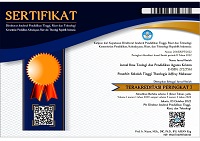Gereja Virtual: Integrasi Gagasan Menjaga Persekutuan Jarak Jauh Menurut Paulus
Abstract
Penelitian ini menyinggung maraknya gereja virtual dalam hal pemafaatan teknologi. Namun masalah yang dihadapi ialah sulitnya membangung sebuah persekutuan sebagai salah satu tujuan gereja. Unik untuk diperhatikan bahwa persekutuan jarak jauh sudah ada sejak jemaat mula-mula terbentuk. Paulus berhadapan dengan persekutuan yang jarak jauh dan – sama seperti sekarang – memaksa Paulus menggunakan media yang ada (surat) untuk berinteraksi. Tetapi bagaimana gagasan Paulus tentang persekutuan jarak jauh sehingga Paulus mampu mempertahankan persekutan adalah fokus utamanya. Penelitian ini menggunakan penelitian kualitatif dengan menerapkan prinsip hermeneutik terhadap Alkitab dan studi kepustakaan lainnya. Dari hasil penelitian, dijumpai beberapa hal dalam exordium Paulus tentang gagasan Paulus membangun persekutuan jarak jauh, diantaranya: (1) Mengingat jemaat dalam doa. Persekutuan jarak jauh membawa Paulus untuk selalu mengingat dan menggumuli persekutuan jarak jauh dalam doa. (2) Mengecek kehidupan rohani. Dalam suratnya, Paulus sering menyinggung tentang ungkapan syukurnya terhadap iman jemaat, yang menandakan Paulus memang sering mencari dan mendengar kabar iman dari jemaatnya. (3) Mengusahakan perkunjungan. Paulus menyadari kekurangan yang besar akan persekutuan yang dibangun dari jarak jauh, sehingga banyak kali dijumpai Paulus ingin mengadakan pertemuan secara langsung untuk persekutuan yang lebih dekat lagi dengan jemaatnya.
Abstract
This research alludes to the rise of virtual churches in terms of the use of technology. But the problem faced is the difficulty of building a fellowship as one of the goals of the church. It is unique to note that long-distance fellowship has existed since the early church was formed. Paul was dealing with a long-distance fellowship and – just like now – forced Paul to use existing media (letters) to interact. But how Paul's idea of long-distance fellowship so that Paul can maintain the fellowship is the main focus. This study uses qualitative research by applying hermeneutic principles to the Bible and other literature studies. From the results of the research, several things were found in Paul's exordium regarding Paul's idea of building a long-distance fellowship, including (1) Remember the church in prayer. Long-distance fellowship led Paul to always remember and struggle with a long-distance fellowship in prayer. (2) Check spiritual life. In his letters, Paul often mentions his expression of gratitude for the faith of the congregation, which indicates that Paul often seeks and hears news of faith from his congregation. (3) Undertake visits. Paul was aware of the great shortage of fellowship that was built remotely, so many times he encountered Paul wanting to hold meetings in person for even closer fellowship with his congregation.
Keywords
Full Text:
PDFReferences
Bauer’s, W. (2000). A Greek-English Lexicon of The New Testament and Other Early Christiant Literature. In F. W. Danker (Ed.), Lexicon (Cet. 3). The University of Chicago Press.
Bryson, J. R., Andres, L., & Davies, A. (2020). Covid-19, Virtual Church Services and New Temporary Geography of Home. Tijdschrift Voor Economische En Sociale Geografie, 111(3), 360–372. https://doi.org/10.1111/tesg.12436.
Chamblin, J. K. (2008). Paulus dan Diri: Ajaran Bagi Keutuhan Pribadi. Surabaya: Momentum.
Dunn, J. D. G. (2018). Word Blibical Commentary: Romans 1-8: Vol. Volume 38A. Michigan: Zondervan.
Elvis, M. (2020). Pedagogi di Era Digital dalam Konteks Pandemi Covid-19. Jurnal Ilmu Teologi dan Pendidikan Agama Kristen, 1(1), 1-16. https://ojs.sttjaffray.ac.id/jitpk/article/view/472.
Fee, G. D. (1984). The New International Commentary on the New Testament: Paul’s Letter to the Philippians. Michigan: Wm. B. Eerdmans Publishing Company.
Gibbs, E. (2013). The Rebirth of the Church. Michigan: Baker Academic.
Grudem, W. (2000). Systematic Theology: An Introduction To Biblical Doctrine. Michigan: Zondervan.
Hay, A. W. (2015). Gaya Hidup Digital Kristiani Era Globalisasi. Jurnal Youth Ministry, 3(1), 51–59. https://doi.org/10.47901/jym.v3i1.429.
Hutasoit, I. (2020). Pandemi Covid-19 dan Wajah Baru Eklesiologi. Jurnal Teologi “Cultivation,” 4(2), 180–203. https://doi.org/ttps://doi.org/10.46965/jtc.v4i2.
Jacob, T. (1992). Paulus: Hidup, Karya dan Teologinya. Jakarta: BPK Gunung Mulia.
Kim, J. Y. (2020). Analog Church: Why We Need Real People, Places, and Things in the Digital Age. Illinois: InterVarsity Press.
Kluver, R., & Chen, Y. (2008). The Church of Fools: Virtual Ritual and Material Faith. Heidelberg Journal of Religions on the Internet, 3(1), 116–143. https://doi.org/10.11588/heidok.00008292.
Lizardo, J. (2020). Penerapan Gereja Rumah sebagai Cikal Bakal Gereja Virtual. Jurnal Teologi Rahmat, 6(2), 92–101. http://sttrem.co.id/e-journal/index.php/jtr/article/view/10.
Lizardo, J. (2022). Refleksi Kehidupan Gereja Perdana dalam Praktik Gereja Virtual. Epigraphe: Jurnal Teologi Dan Pelayanan Kristiani, 6(2), 209–221. http://dx.doi.org/10. 33991/epigraphe.v6i2.390.
Lobang, M. M., Camerling, Y. F. (2021). Media Pembelajaran dan Kurikulum Pendidikan Jemaat dalam Gereja Berbasis Online untuk Menghadapi Perubahan Globalisasi Abad ke-21. Jurnal Ilmu Teologi dan Pendidikan Agama Kristen, 2(1), 61-78. https://ojs.sttjaffray.ac.id/jitpk/article/view/488.
Moo, D. J. (1996). The New International Commentary on the New Testament: The Epistles to the Romans. Michigan: Wm. B. Eerdmans Publishing Company.
Morris, L. (1988a). The Epistle To The Romans. Michigan: Wm. B. Eerdmans Publishing Company.
Morris, L. (1988b). TPNC: The Epistles of Romans. Michigan: Wm. B. Eerdmans Publishing Company.
Ridderbos, H. (2010). Paulus: Pemikiran Utama Theologinya. Surabaya: Momentum.
Sumaryanto, T. O., & Adji, H. (2020). Perekutuan Umat Allah di Dalam Cyberspace. Jurnal Teologi Kontekstual Indonesia, 1(2), 127–142. https://journal.sttsimpson.ac.id/index.php/JTKI/article/view/346/pdf.
Susanta, Y. K. (2020). Gereja Sebagai Persekutuan Persahabatan yang Terbuka Menurut Jurgen Moltmann. VISIO DEI: Jurnal Teologi Kristen, 2(1), 105–126. https://doi.org/10.35909/visiodei.v2i1.86.
Susanto, D. (2020). Konstruksi Teologis Gereja Digital: Sebuah Refleksi Biblis Ibadah Online di Masa Pandemi Covid-19. Epigraphe: Jurnal Teologi Dan Pelayanan Kristiani, 4(1), 1–17. http://dx.doi.org/10.33991/epigraphe.v4i1.145.
Sutanto, H. (1998). Hermeneutik: Prinsip dan Metode Penafsiran Alkitab. Malang: Literatur SAAT.
Sutanto, H. (2019). Perjanjian Baru Interlinear Yunani-Indonesia dan Konkordansi Perjanjian Baru (PBIK): Jilid I (Revisi). Jakarta: Lembaga Alkitab Indonesia.
Warren, R. (2019). The Purpose Driven Church. Jakarta: Gandum Mas.
Widjaja, F. I., Marisi, C. G., Togatorop, T. M. T., & Hartono, H. (2020). Menstimulasi Praktik Gereja Rumah di Tengah Pandemi Covid-19. KURIOS: Jurnal Teologi Dan Pendidikan Agama Kristen, 6(1), 127–139. https://doi.org/10.30995/kur.v6i1.166.
DOI: http://dx.doi.org/10.25278/jitpk.v4i1.848
viewed = 0 times











